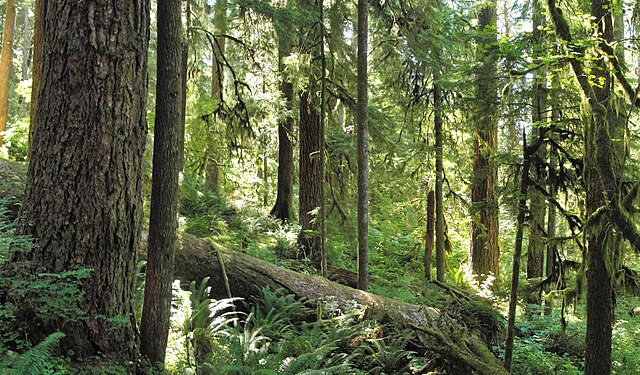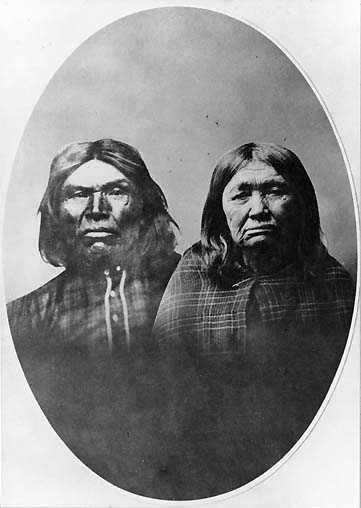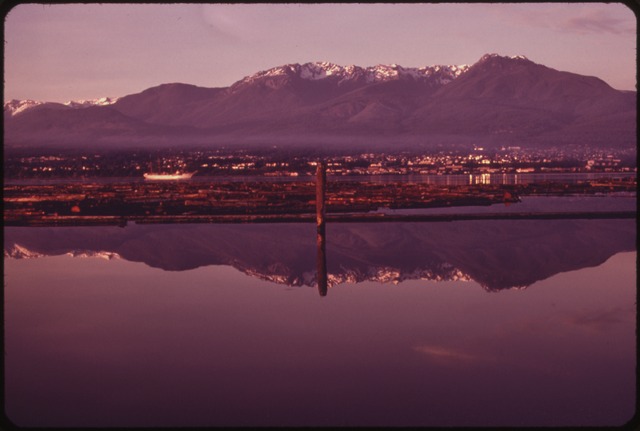Review and interview
Talk about how the story of this novel suggested itself
and came to take shape for you.
What can readers expect from you next?
Well, The Revised Fundamentals of Caregiving just came out. It's a novel about finding hope in the face of irredeemable loss. I think it's sort of a coming-of-middle-age about a male nurse in crisis.
I'm currently working on a novel called Harriet Chance, which is sort of a love letter to the women of the great generation. Also, I recently finished a novel called The Dreamlife of Huntington Sales, which is a weird literary mash-up.
Thanks, Jonathan. Every success.
Photo credits: Wikimedia Commons
Coming up: Frederick Niven, The Lost Cabin Mine (1908)
Jonathan Evison currently has a new novel getting good
reviews, but I just got around to reading his last one. So while the reviewers
are busy saying nice things about The Revised Fundamentals of Caregiving, BITS is taking a look back at West of
Here, published a year ago.
At 480 pages, West of Here recalls those big, fat American novels of the previous century when
being taken seriously required a whole lot more paper than it does today. With
short fiction more in fashion now, that’s a brave stand for a writer to take. A
big, fat novel has the effect of total immersion in a time and place and an
intimate familiarity with its characters. So I’m making another plug here for
its survival.
Plots. Like John Sayles’
A Moment in the Sun (reviewed here a while ago), Evison’s novel introduces us to a large cast of
characters, each with their own storyline. Some live in 1890 and some in 2006.
They are united by the fact that they inhabit the same spot on Earth, the strip
of shoreline between the Strait of Juan de Fuca and the mountains of
Washington’s Olympic Peninsula.
 |
| Olympic Mountains, near Port Angeles |
We meet some of the first settlers, their types already
familiar to readers of historical westerns. There’s the saloonkeeper, a
newspaper editor, the residents of a utopian community, Indians, Chinese,
prostitutes, storekeepers, and so on. Prominent among them is a “founding
father” of the community, a visionary who starts construction of a dam on the
river that flows through town.
Among the town’s 21st century residents are descendants of
some of those same people. We meet characters who make a living at a fish
processing plant. One of them, Krig, is obsessed with Sasquatch sightings and
has what he takes to be a hair-raising close encounter with one or more of them
in an early chapter. Krig’s boss is a great-grandson of the original dam
builder and has lived to see plans for its demolition.
Rita, an employee, gets in too deep with an abusive
boyfriend, while her son gets in too deep with some heavy-duty drugs. Hillary,
a field researcher for the dam demotion project, gets involved with an
African-American parole officer. He gets lost in the woods while in pursuit of
a parolee who quits his new job and hives off on a mountain trail above the dam
to live as a recluse.
 |
| Old-growth rainforest, Olympic National Park |
Parallels. All of
these modern-day story lines have their parallels among the characters living
in 1890. Franklin the parole officer and Timmon the parolee strike off into the
rugged terrain above the town like the four-man Mather expedition. The intrepid
explorers are the first whites to cross over the uncharted mountains—in
winter—to the Pacific coast on the other side. The modern version of that
earlier journey, with Snickers bars and a gym bag for a trail pack, is a comic
reenactment.
A constant across the years are the Native Americans who
have called this spot home far longer than the whites who moved in on them.
They begin to blend in, as some adopt white manners and values while becoming
property owners and assimilating into the new economy. The flip side of this
meeting of cultures is the illegal sale of alcohol to the rest of them by a
saloon owner who cares nothing for the damage done.
 |
| Klallam chief and wife, 1884 |
Somewhere between these extremes is the carnal intimacy that
occurs between a white man and an Indian girl. Their child is born during a
violent storm in the book’s opening pages, and undergoing a kind of time slip,
he seems to appear again in 2006, embodied in a schoolboy who appears in a
convenience store, nearly catatonic, his arms covered with unexplained burns.
Both sets of characters are like outlier bookends to a
period of American progress that starts with muddy streets and haphazard,
fire-prone structures housing frontier free enterprise. And it ends with a sad
and wan consumer society of fast food restaurants and dead end jobs, where
folks gather anyway for the annual Dam Day, to celebrate another year of the
American dream, such as it’s become.
Wrapping up. In
other hands, this novel could easily have become satiric and even mean, its
characters comically unsympathetic. But Evison clearly loves them, even as they
settle for second best and fail to really connect with each other. Lonely and
yearning for something better, they still live in hope that tomorrow will be a
better day.
His modern characters make a sharp contrast with the people
of the utopian community who try, in 1890, to build a settlement on the
outskirts of town. As so many of these social experiments did in the American
West, they disappear like the young woman, Eva, who realizes her kind of
American dream has no future there and returns to Chicago.
The American way that has evolved over a century in the West
keeps the town going, the grand expectations of its founders scaled down to
human size. Faith in something called progress turns out to be largely an
illusion. The Indians camping out on the beach when the whites first arrived
had already figured that out.
West of Here is
currently available at amazon, Barnes&Noble, and AbeBooks, and for kindle
and the nook.
 |
| Jonathan Evison |
Interview
Jonathan Evison has consented to spend some time here today to
talk about writing and the writing of West of Here. I’m happy to turn the rest of this page over to
him.
I’ve been camping and hiking the peninsula for years. I’ve
passed through Port Angeles and Forks and Aberdeen and Shelton and all the
moribund little former-boom-towns ringing the peninsula more times than I can
count.
And I always think about Faulkner’s assessment of the south:
that the past is not the past in the south. Nor is the past the past here on
the Olympic Peninsula, where these little towns, now economically ravaged, are
forced to reckon with their early mistakes and failed institutions.
 |
| Port Angeles, Washington, 1973 |
How closely does the finished novel compare to the way you originally conceived it?
Surprisingly
close. My idea was to write NOT a historical novel, but a novel about
history. I wanted to subvert and frustrate as many of the tropes of
historical fiction as I could—linear timelines, big events,
Shakespearean characters, etc.
So
I conceived a novel that was non-linear, grounded in small, intimate
moments, about working class people, and how these small moments in
their lives reverberate through time. Pretty much what I ended up with.
It is worth noting that historical fiction fans absolutely hated it.
What was involved in your research for the novel?
About
18 months. Maybe forty books, ten spiral notebooks. A lot of hiking. A
lot of interviews. Then, like a method actor, I did my best to forget it
all, so it wouldn't get in the way of the story I wanted to tell.
Was there any material you found in your research that you wanted to include but chose not to?
About
80% of it. I learned tons of fascinating stuff that just didn't have a
place in the story. Such as the break of the federal reserve in Port
Angeles in 1889. Great stuff, would have made for a great historical
novel, which of course, I had no interest in writing. Look it up,
though, it's a cool story.
Did you ever find that fact got in the way of fiction as you wrote?
Fact
always gets in the way of fiction. But facts are of less concern for me
than truth. Nothing quite gets at the truth like fiction.
Did anything about the story or the characters surprise you as you were writing?
My
characters often surprise me. Sometimes I don't give them enough
credit. Sometimes they make the right decision when I want them to make
the wrong one. Wrestling ensures.
 |
| Olympic National Park, Washington |
How did you decide on the novel's title?
The
fundamental questions the novel asks are things like: Where exactly ARE
we right now? What is our new national consciousness now that manifest
destiny has failed us? Who are we now that we're not longer the world's
producer? Where do we go now that we can go no further—figuratively or literally—west? So, the ambiguity of the title just fit.
What have been the most interesting reactions to the novel so far?
How
divisive the book is. People seem to either love it or hate it. In my
experience, people who keep their eye on the big picture, people who
approach it as a novel of place, really dig it. The people who complain
that there's too many characters, seem to miss the point. In my
conception, there is only one character: Port Bonita. Everybody else is
there to serve the town.
Who, if anyone, would you trust to make a film of the novel?
Maybe Robert Altman. But he's dead.
What are you reading now?
Just finished J. Robert Lennon's brilliant new novel, Familiar, and am about to dig into Ron Currie Jr.'s newest, Flimsy Little Plastic Miracles which comes out, I believe, in spring.
What writers of the West, living or dead, do you consider undeservedly unknown?
Not that Frank Norris is unknown, but man, McTeague just rocks my world. One of the great novels about the American West.
What do you learn from your readers?
That they don't wanna pay twenty-five bucks for a hardback—ha!What can readers expect from you next?
Well, The Revised Fundamentals of Caregiving just came out. It's a novel about finding hope in the face of irredeemable loss. I think it's sort of a coming-of-middle-age about a male nurse in crisis.
I'm currently working on a novel called Harriet Chance, which is sort of a love letter to the women of the great generation. Also, I recently finished a novel called The Dreamlife of Huntington Sales, which is a weird literary mash-up.
Thanks, Jonathan. Every success.
Photo credits: Wikimedia Commons
Coming up: Frederick Niven, The Lost Cabin Mine (1908)

Speaking of westerns, did you see the series "into the west?" I only was able to catch bits and pieces but it looked very well done and with some good actors.
ReplyDeleteI missed it for some reason, but it just went into the queue at netflix. I notice in the credits that one of the directors was Simon Wincer, who directed the LONESOME DOVE miniseries.
DeleteEvison was at the BookFest this year as well. One of these years I may actually talk to him. I was in LA a couple weeks ago and he was doing a reading there; I was going to go, but traffic quickly turned me back, as I was North in Camarillo and got a late start. Ended up going to a boxing gym in Oxnard instead.
ReplyDeleteAnyway, I have West of Here but haven't read it yet. My mom read it an liked it, I know that. Jonathan's fun on panels, and The Revised Fundamentals of Caregiving sounds great.
Chris, I guess I left LA a little too soon; I've missed several events there this year. Evison was an entertaining panelist last year, for sure. What did he have to say about his new book?
DeleteIt seems the book has a lot of autobiographical influence that are amusing. He didn't talk a lot about it, and I didn't go to his reading.
DeleteI LOVED Fundamentals of Caregiving and have recommended it to everyone I know so I will look for this one. It's a bit longer than my preferred length but hey.
ReplyDelete